
The Army of Northern Virginia was the primary military force of the Confederate States of America in the Eastern Theater of the American Civil War. It was also the primary command structure of the Department of Northern Virginia. It was most often arrayed against the Union Army of the Potomac.
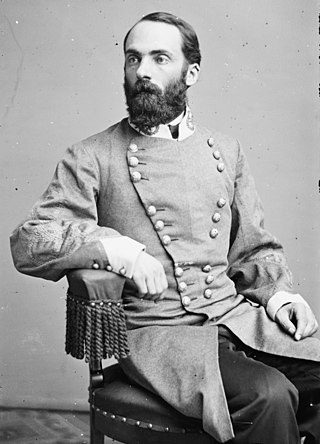
Joseph "Fighting Joe" Wheeler was a military commander and politician of the Confederate States of America. He was a cavalry general in the Confederate States Army in the 1860s during the American Civil War, and then a general in the United States Army during both the Spanish-American and Philippine–American Wars near the turn of the twentieth century. For much of the Civil War, he was the senior cavalry general in the Army of Tennessee and fought in most of its battles in the Western Theater.

Howell Cobb was an American and later Confederate political figure. A southern Democrat, Cobb was a five-term member of the United States House of Representatives and the speaker of the House from 1849 to 1851. He also served as the 40th governor of Georgia (1851–1853) and as a secretary of the treasury under President James Buchanan (1857–1860).

Lafayette McLaws was a United States Army officer and a Confederate general in the American Civil War. He served at Antietam and Fredericksburg, where Robert E. Lee praised his defense of Marye's Heights, and at Gettysburg, where his division made successful assaults through the Peach Orchard and Wheatfield, but was unable to dislodge Union forces from Cemetery Ridge. After the Knoxville Campaign, he was court-martialed for inefficiency, though this was overturned for procedural reasons. Finally, he was sent to his native Georgia to resist Sherman's March to the Sea but retreated through the Carolinas, losing many men through desertion, and was presumed to have surrendered with Joseph E. Johnston in April 1865.

Evander McIver Law was an author, teacher, and a Confederate general in the American Civil War.

Alfred Holt Colquitt was an American lawyer, preacher, soldier, and politician. Elected as the 49th Governor of Georgia (1877–1882), he was one of numerous Democrats elected to office as white conservatives took back power in the state at the end of the Reconstruction era. He was elected by the Georgia state legislature to two terms as U.S. Senator, serving from 1883 to 1894 and dying in office. He had served as a United States officer in the Mexican-American War and in the Confederate States Army during the American Civil War, reaching the rank of major general.

Alexander Peter Stewart was a Confederate military officer during the American Civil War and a college professor. He fought in many of the most significant battles in the Western Theater of the war and briefly took command of the Army of Tennessee in 1865.
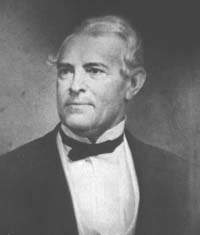
George Alfred Trenholm was a South Carolina businessman, financier, politician, and slaveholding planter who owned several plantations and strongly supported the Confederate States of America. He was appointed as its Secretary of the Treasury during the final year of the American Civil War.

Gilbert Moxley Sorrel was a staff officer and brigadier general in the Provisional Army of the Confederate States.
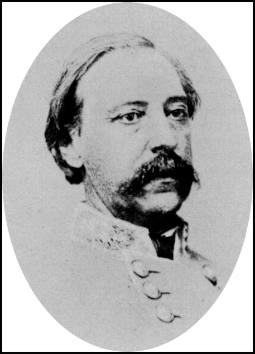
Goode Bryan was a planter, politician, military officer, and American Civil War general in the Confederate States Army. His brigade played a prominent role during the Battle of the Wilderness, fighting stubbornly until exhausting its ammunition.
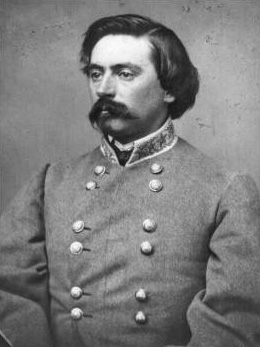
Pierce Manning Butler Young was an American soldier, politician, diplomat, and slave owner. He was a major general in the Confederate States Army during the American Civil War, and after the war a four-term United States Congressman from Georgia, before serving in the diplomatic corps.
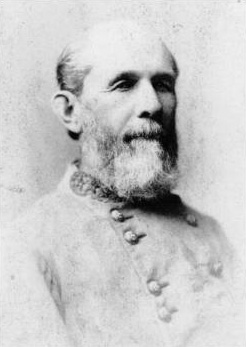
William Tatum Wofford was an American military officer who saw action in the Mexican–American War and later served as a general in the Confederate States Army during the American Civil War.

James Dearing was a Confederate States Army officer during the American Civil War who served in the artillery and cavalry. Dearing entered West Point in 1858 and resigned on April 22, 1861, when Virginia seceded from the Union. Dearing was mortally wounded at the Battle of High Bridge during the Appomattox Campaign of 1865, making him one of the last officers to die in the war. Despite serving as a commander of a cavalry brigade and using the grade of brigadier general after he was nominated to that grade by Confederate President Jefferson Davis, Dearing did not officially achieve the grade of brigadier general because the Confederate Senate did not approve his nomination. His actual permanent grade was colonel.

Florida participated in the American Civil War as a member of the Confederate States of America. It had been admitted to the United States as a slave state in 1845. In January 1861, Florida became the third Southern state to secede from the Union after the November 1860 presidential election victory of Abraham Lincoln. It was one of the initial seven slave states which formed the Confederacy on February 8, 1861, in advance of the American Civil War.

Texas declared its secession from the Union on February 1, 1861, and joined the Confederate States on March 2, 1861, after it had replaced its governor, Sam Houston, who had refused to take an oath of allegiance to the Confederacy. As with those of other states, the Declaration of Secession was not recognized by the US government at Washington, DC. Some Texan military units fought in the Civil War east of the Mississippi River, but Texas was more useful for supplying soldiers and horses for the Confederate Army. Texas' supply role lasted until mid-1863, when Union gunboats started to control the Mississippi River, which prevented large transfers of men, horses, or cattle. Some cotton was sold in Mexico, but most of the crop became useless because of the Union's naval blockade of Galveston, Houston, and other ports.

Georgia was one of the original seven slave states that formed the Confederate States of America in February 1861, triggering the U.S. Civil War. The state governor, Democrat Joseph E. Brown, wanted locally raised troops to be used only for the defense of Georgia, in defiance of Confederate president Jefferson Davis, who wanted to deploy them on other battlefronts. When the Union blockade prevented Georgia from exporting its plentiful cotton in exchange for key imports, Brown ordered farmers to grow food instead, but the breakdown of transport systems led to desperate shortages.
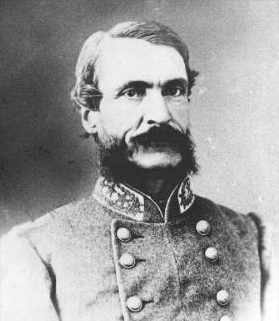
James Patton Anderson was an American slave owner, physician, lawyer, and politician, most notably serving as a United States Congressman from the Washington Territory, a Mississippi state legislator, and a delegate at the Florida state secession convention to withdraw from the United States. He also served in the American Civil War as a general in the Confederate States Army, serving in the Army of Tennessee.

James Ronald Chalmers was an American politician and senior officer of the Confederate States Army who commanded infantry and cavalry in the Western Theater of the American Civil War.
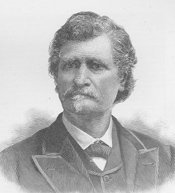
William Harrison "Howdy" Martin was a Texas State Senator, U.S. Representative from Texas and veteran of the Confederate States Army who served under Robert E. Lee.
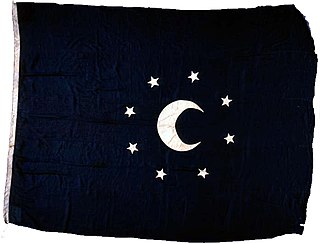
The 1st Florida Battalion Special Cavalry, nicknamed the "Cow Cavalry", was a Confederate States Army cavalry unit from Florida during the American Civil War. Commanded by Charles James Munnerlyn; it was organized to protect herds of cattle from Union raiders. The hides and meat from Florida cattle were a critical supply item for the Confederacy.




















